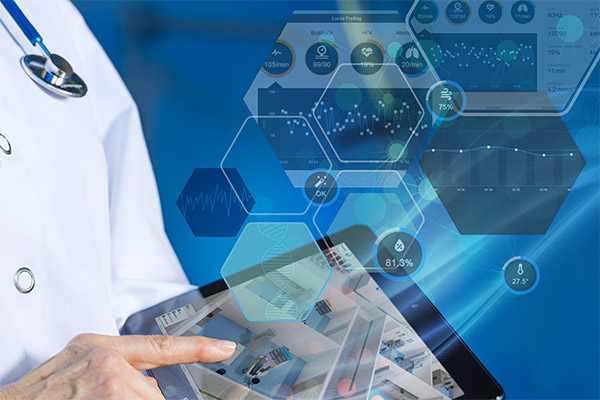AI tools in intensive medicine
Health-tech company TCC enters into exclusive strategic partnership with Fraunhofer IGD
Hamburg/Darmstadt, 11th July 2023: TCC, a provider of remote support services to intensive care units, and the Fraunhofer Institute for Computer Graphics Research IGD have entered into an exclusive strategic partnership for the joint development of AI-supported tools in healthcare. The aim is to pool the competencies of the two partners in research and product development. While TCC develops the software and algorithms and supplies the clinical real-time data (“Real World Data”), Fraunhofer IGD will use its expertise in applied science to validate the results. The first joint project in wound management is already well advanced, and further use cases will be identified in the coming weeks and months. Because the collaboration is intended to be a long-term arrangement, TCC will become part of the clinical partner network of Fraunhofer IGD in the Health and Care business area.

The first joint project already clearly shows what both partners intend to accomplish in the future, namely the implementation of scientifically validated tools and features for intensive care units in clinics and hospitals. In wound care, as in many other cases which ICUs have to deal with, every minute counts. One of the most important aspects is wound identification. Using the parameters and image data that TCC obtains in real time from the intensive care units and the algorithms developed by Fraunhofer IGD, the TCC software can automatically identify the location, size and type of wound. These results are then validated by Fraunhofer IGD, making use of its expertise in sensor technology and image recognition. With the results from the wound analysis, the intensive care physicians in the TCC Competence Center gain valuable time in providing targeted support to their colleagues in the hospitals. The Telehealth Competence Centers in Hamburg and Berlin are staffed by specialists around the clock, seven days a week, and currently provides remote medical consulting services to no fewer than 13 hospitals.
“Fraunhofer IGD is the ideal partner for TCC,” is the considered verdict of Prof. Dr. Christian Storm and David Barg, founders and managing directors of TCC. “The institute provides the scientific basis and validates our results, which we are able to obtain from medical data supplied by the ICU. We are very pleased about the partnership and now intend to work on jointly identifying areas in the field of machine learning and AI that provide practical added value in the hospital environment. We see great potential in our collaboration with Fraunhofer IGD, especially in the area of predicting disease progression. Also in making our tools even better known to clinics and hospitals.”
Fraunhofer IGD applies AI to the analysis of healthcare data
For many years now, machine learning and artificial intelligence methods and procedures have been used at Fraunhofer IGD to analyze and evaluate vital and general health data as well as disease-related patient data. The techniques include AI-based medical image processing, visual cohort analysis and anomaly detection in vital data.
Dr. Wolfgang Müller-Wittig, Head of Competence Center Health and Care at Fraunhofer IGD: “For us as an institute of applied science, exchange with clinical partners is essential. Only if we are aware of the actual everyday challenges in clinics and hospitals can we develop technologies that help to solve the problems they have to deal with. TCC is an ideal partner for us, because the data from the intensive care units can be used to derive predictions about the course of a disease and make early therapy recommendations – which can ultimately save lives.”
Digital twins planned for the simulation of disease progression
Further applications are planned for the future, as TCC intends to develop digital twins for various purposes, chiefly simulating the course of diseases. Such simulations can, for example, be used to determine the risk of dialysis or of mortality at an early stage, and the results will then be validated by Fraunhofer IGD. The partnership also includes joint workshops on digitalization strategies in hospitals, cooperation in the area of research (including publication of the results) and a generally close exchange within the expert network.
 Fraunhofer Institute for Computer Graphics Research IGD
Fraunhofer Institute for Computer Graphics Research IGD